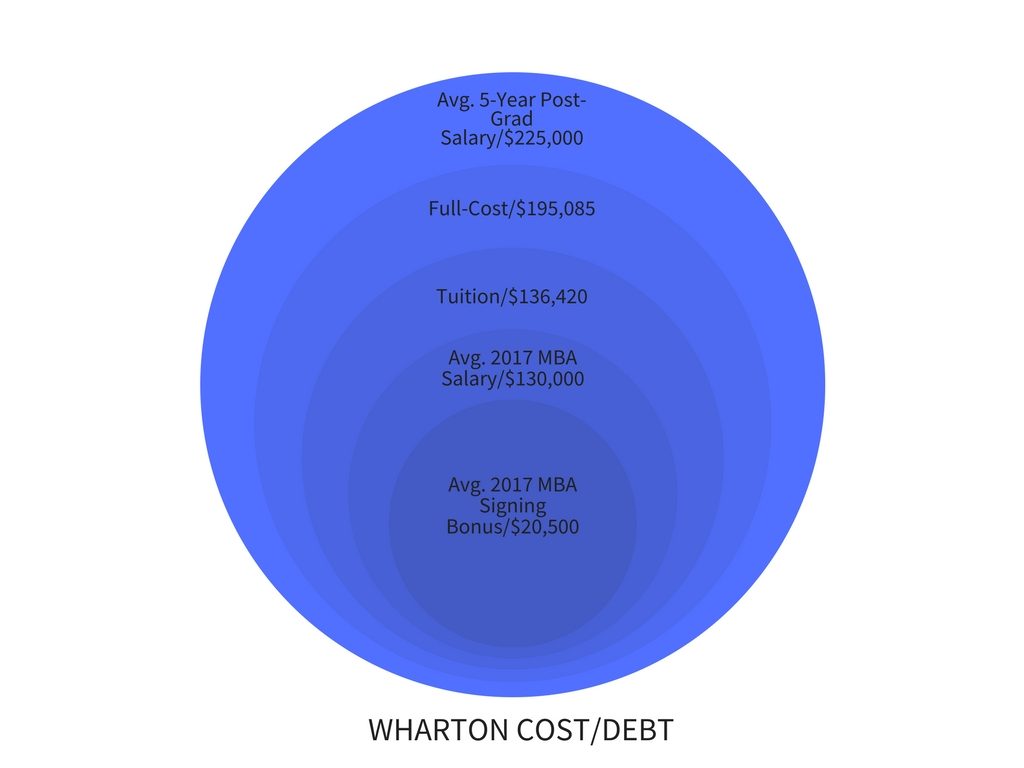Finding Philly’s Best MBA Return on Investment

It’s no secret that Philadelphia’s relatively low cost of living has historically made the Birthplace of America an attractive option for those in search of a big city experience outside the skyrocketing markets of other major East Coast cities.
As people flock from the New York metro region in search of a similar urban adventure at a substantially lower price point, Philadelphia has been controversially dubbed the “6th Borough.” Word to the wise for potential b-school interlopers: never tell any Philadelphian their home has been annexed by New York City.
About 90 minutes by train from New York City, the City of Brotherly Love is no Big Apple, but it’s one-of-a-kind. Sure, tourists and locals alike grip cheesesteaks in one hand while pumping their fists on the steps of the Art Museum a la Rocky, but the city reveals itself to those who have the patience (and wherewithal) to dig into it.
Whether that means embarking on a two-year MBA program or choosing among the accelerated options available, Philadelphia just happens to be home to several top ranked MBA programs in the world. Let’s take a close look at Philly’s programs. Oh, and here’s a napkin for the wiz.
Philadelphia Return on Investment
University of Pennsylvania’s Wharton School of Business
Officially the oldest business school in the U.S., The Wharton School at the University of Pennsylvania boasts well-known alumni billionaire financier Ron Perelman, LinkedIn CEO Jeff Weiner, and John Sculley of Pepsi and Apple. Wharton’s tuition of $136,420 and estimated total budget of $195,085 isn’t to be taken lightly. However, full-time MBA graduates earn an average base salary of $130,000 with an average bonus of $20,500, and a supreme 92.6 percent job acceptance rate. So, while having a somewhat unimpressive salary-to-debt ratio, Wharton’s reputation and alumni network precedes itself.
In fact, the school recently topped the annual Forbes best full-time MBA program list, sporting the best five-year financial gain after graduation. Wharton MBA graduates of the Class of 2012 are making a $225,000 average annual salary—roughly 42 percent higher than recent grads, easily topping the cost/debt ratio of the program.

Saint Joseph’s Haub School of Business
Notable alumni of Haub School of Business at Saint Joseph’s University include CEO of NutriSystems, Inc. Michael J. Hagan, Chairman and founder of Philadelphia Consolidated Holding Corporation James J. Maguire, and Senior vice president of PNC Bank Denise Viola-Monahan. SJU’s $30,294 tuition set against an average base salary of $65,000 means the school offers a competitive MBA to those who don’t want to break the bank.
Temple’s Fox School of Business
Fox School of Business at Temple University’s notable alumni include Systel CEO Jai Gulati, former COO and president for ConocoPhillips John Carrig, and CEO of Actavis and co-founder of Health Care Compliance Association Brenton L. Saunders. Fox’s tuition sits at $57,048 for residents and $80,484 for nonresidents. With a 97 percent job placement rate compared to $25,623 average debt and a $85,278 average base salary, Fox’s salary-to-debt ratio looks attractive.
Drexel University LeBow College of Business
The LeBow College of Business at Drexel University alumni include President and CEO of Rohm and Haas Raj Gupta, former CEO of Science Applications International Corp. Kenneth C. Dahlberg, and the Phillie Phanatic Tom Burgoyne. Tuition is $59,565, and graduating MBAs carry an average debt of $43,894. With a reported average base salary of $84,080, LeBow’s salary-to-debt ratio is competitive. Considering the comparatively low price point, LeBow emerges as an incredibly attractive ROI.
YOU MAY ALSO LIKE: How Philadelphia MBA Programs Help Lower-Income Applicants
University of Delaware Lerner College of Business
A short 20-minute train ride from Center City Philadelphia and under two hours from New York City, the Lerner College at the University of Delaware has an eye-catching reported average base salary of $90,291. Compared to tuition, which ranges from $33,000 to $55,000, depending on residency, Lerner’s ROI could shine through if figures hold true for most MBA earners from this institution.
Penn State Smeal College of Business
Although its central campus is located in Happy Valley, PA, the Smeal College of Business at Penn State offers an executive MBA program in Philadelphia. The program is priced at a hefty $102,000, but average graduate debt is reported at $36,500, and median salaries ranging from $97,890 to $101,857. With such an impressive salary-to-debt ratio, Smeal is an attractive option for those who prefer easy metro access rather than living in the thick of the action. Notable alumni include Chairman and CEO of Petroleum Products Corp. John Arnold, and Former Chairman and CEO of Merrill Lynch & Co. William Schreyer.
Kogod Professor Explains 3 Cyber Security Misconceptions

Cyber crime costs the world economy about $445 billion every year. According to an industry risk analysis report from 2016, cyber risks ranked third out of the top business risks, already 12 places higher than in just five years ago. Needless to say, cyber security misconceptions become a major concern in the modern business world that needs to be addressed sooner rather than later. Continue reading…
Chicago Booth Launches New Capitalisn’t Podcast

Since Mark Maron’s WTF and the mystery thriller Serial launched into the pop culture lexicon, the podcast went from a niche medium to a common part people’s weekday commute. Capitalisn’t—the new podcast from the Stigler Center at the University of Chicago Booth School of Business—explores what is and isn’t working in capitalism today Continue reading…
Admissions Tip: Clearing Up the Background Check

With a slew of schools releasing their R1 notifications, we know that many of our readers will be asking about the background checks conducted by leading programs. Here are some quick facts to help explain the process:
1. What are background checks?
Background checks involve the verification of information that a candidate has provided in his or her MBA applications. Although the process varies from school to school, it usually includes checking that an applicant attended the undergraduate (or graduate) school(s) that he or she claims to have attended, received the grades indicated and earned the GMAT score reported. It also involves the verification of the candidate’s employment history, job titles, starting and ending dates and salary/bonus information. Finally, some background checks involve contacting recommenders to verify their support and confirming applicant involvement in community activities.
2. Do all schools conduct background checks?
When do they do this? How do they have time? Many of the leading MBA programs like to verify the information that has been provided by applicants. This is typically done only for those applicants who are admitted, since there is no sense in expending resources to verify information for applicants who do not make the cut. Most background checks occur in the spring – after decisions for most rounds have been released and students begin sending in their deposits. In many cases, the schools outsource this function to a professional risk consulting firm like Kroll.
3. Why bother with background checks? Don’t the schools trust me?
The purpose of background checks is to protect all stakeholders of the MBA program (students, faculty, staff, alumni) from those who would falsify their backgrounds to gain an unfair advantage in the admissions process. Some schools opt to investigate the backgrounds of a relatively small sample of randomly selected admits, hoping that the mere possibility of a check will give applicants incentive to be as honest as possible. In a way, this measure therefore serves to increase the adcom’s trust in its applicants.
4. What about very minor discrepancies?
It’s natural for admitted applicants to get anxious at this point in the process, wondering whether their offer of admission might be rescinded if, for instance, the “start date” for an old job is one week earlier than the start date that HR reports during the background check. The good news is that most schools report any discrepancies back to the applicant and give them a chance to explain a plausible mistake. Having said that, it of course makes sense to do your best to verify all of your information before applying to school, so that you can be certain that the data you report is accurate. Should any potential issues come to mind after submitting, you might consider preemptively contacting the adcom if the error is serious enough.
5. Won’t the background checking process alert my employer to the fact that I am applying to b-school?
Since the process typically takes place long after you’ve been admitted, this ideally won’t be an issue, as most applicants give their employers ample notice and take some time off before school. Having said that, the schools still try to conduct the checks in a discrete fashion, consulting with your HR department to verify your dates of employment and salary – but not necessarily revealing that you are heading to business school.
6. How can I ensure a smooth background check?
While the obvious answer is to be honest in your applications, it’s also important that you don’t fudge anything out of laziness (a common occurrence). Dig up those old W-2 forms or check with former employers in order to present the committee with the most accurate information you can.
Stay up to date with all of our latest MBA admissions tips here.
This article has been edited and republished with permissions from our sister site, Clear Admit.
How to Turn an MBA into a Career with Tesla

Tesla, Inc. founder and the tech entrepreneur world’s newest shining beacon Elon Musk, a graduate of the Wharton School at the University of Pennsylvania, once pessimistically said, “As much as possible, avoid hiring MBA’s. MBA programs don’t teach people how to create companies … our position is that we hire someone in spite of an MBA, not because of one.” Continue reading…
The Secret to Writing a Successful MBA Career Goals Essay in 2018

The MBA application essay is still the most feared part of most applications. Whether you have to write 1,000 words or just 500, saying everything you need to say in a concise, intelligent, and appropriate manner isn’t easy for everyone. In fact, it can be incredibly frustrating. And while every school asks different essay questions, there’s one question you’re almost guaranteed to see, “What are your short-term and long-term post-MBA career coals and how will School X help you achieve these goals?”
The career goals essay is one of the most common and also most difficult essay questions. On the surface, it seems simple, but there’s a lot of work required if you want to wow the admissions committee (adcom). It all starts with the question.
Breaking Down the MBA Career Goals Essay
Before you can write your career goals essay, you have to break it down into digestible and answerable pieces. There are six pieces to the career goals essay that you’ll need to consider before you begin writing.
1. Where are you now?
Before you can talk about your goals, you have to know where you are now and so does the adcom. This means that your essay will need to concisely describe your current position so that you can better explain your goals.
2. What are you short-term goals?
Short-term and long-term goals are not the same. Short-term goals refer to your immediate plans after graduation. Is there a particular industry where you want to work? Do you have a job or promotion in mind? Where do you see yourself in the immediate months post-MBA?
3. What are your long-term goals?
Long-term goals take a little more thought. You might not be as specific about companies or job titles when talking about your long-term goals, but that doesn’t mean you shouldn’t have a plan. Think about where you want the MBA to take you in ten or twenty years.
4. Why will an MBA help?
Next, you need to discuss how an MBA will help you achieve both your short-term and long-term goals. You’ll need to discuss technical skills, analytical skills, focus areas, and more.
5. Why is the School vital?
You need to make your essay personal. Not just any MBA should work for your goals. You need to explain specifically why School X is vital to your success. Get as specific as possible.
6. Why now?
Finally, you need to discuss why NOW is the best time to get your MBA and pursue your goals. Make a case for why this year, this class, and this moment are vital to your life.
Writing the MBA Career Goals Essay
Now that you know all the components of the essay, it’s time to start writing. To successfully answer the question, there are a few things that you need to keep in mind.
Be Specific
You need to be as specific as possible when answering each of the six parts of the question. MBA adcoms want to see that you have a specific direction in mind and that you have valid reasons for your choices. If possible, you should be able to specify your preferred industry, job function, skills, ideal company, and more.
For example: Talk about how you want to move into a career in Finance and gain a job at Goldman Sachs. Then, talk about how the MBA will help you gain technical skills in Finance and Accounting as well as analytical skills in Corporate Strategy and Strategic Planning. Finally, discuss how the case competitions at School X, as well as the MBA Finance Club, will prepare you for this career field.
Be Realistic
Adcoms want you to dream big, but they also want you to be realistic. There’s nothing impressive about an MBA career goals essay that describes a future path that is unreachable or illogical. Unrealistic goals will not serve to demonstrate that you’re ready for an MBA. Instead, you need to walk the fine line between thinking big and demonstrating that your career path has been well thought out and planned. Look up hiring trends, services, organizations, market status, and competitive concerns within your desired industry and companies.
For example: It’s okay to talk about your goals of managing a billion dollars, but you should indicate that this is a long-term goal, and you have a plan to reach it. Go step-by-step to illustrate that you know what it takes to reach your high aspirations by first talking about starting as a Finance Manager and slowly working your way up over twenty years.
Be Genuine
Adcoms can smell BS. You have to convince them that you are genuine in your interest of not just the MBA but of earning an MBA from School X. Take time to do your research and dig deep for those specific offerings from the program that will best serve you and your goals. If you can name specific classes, on-campus impressions, or information you’ve learned from alumni to demonstrate your genuine desire for an MBA, you’ll be in a much better place.
For example: Set up an interview to talk with an adcom or alumni before you write your essay. Then, during that interview, ask questions that will give you the information you need to beef up your essay. If you can talk about how an alum took the same career path and succeeded, you not only demonstrate your interest but your keen intellect.
Be Clear
Finally, make sure you write an essay that is clear and easy to read. Don’t worry about crafting the next great American novel. Instead, focus on answering the question as simply as possible and including all the necessary pieces. This is not a creativity contest. Instead, create a simple outline that you can fill out to answer the six components of the essay.
For example: You should write out the six questions (career analysis, short-term goals, long-term goals, why MBA, why School, why now) and come up with your answers separately. Then, once you have the outline and all the pieces, compile them together into a cohesive story. Don’t try anything fancy.
